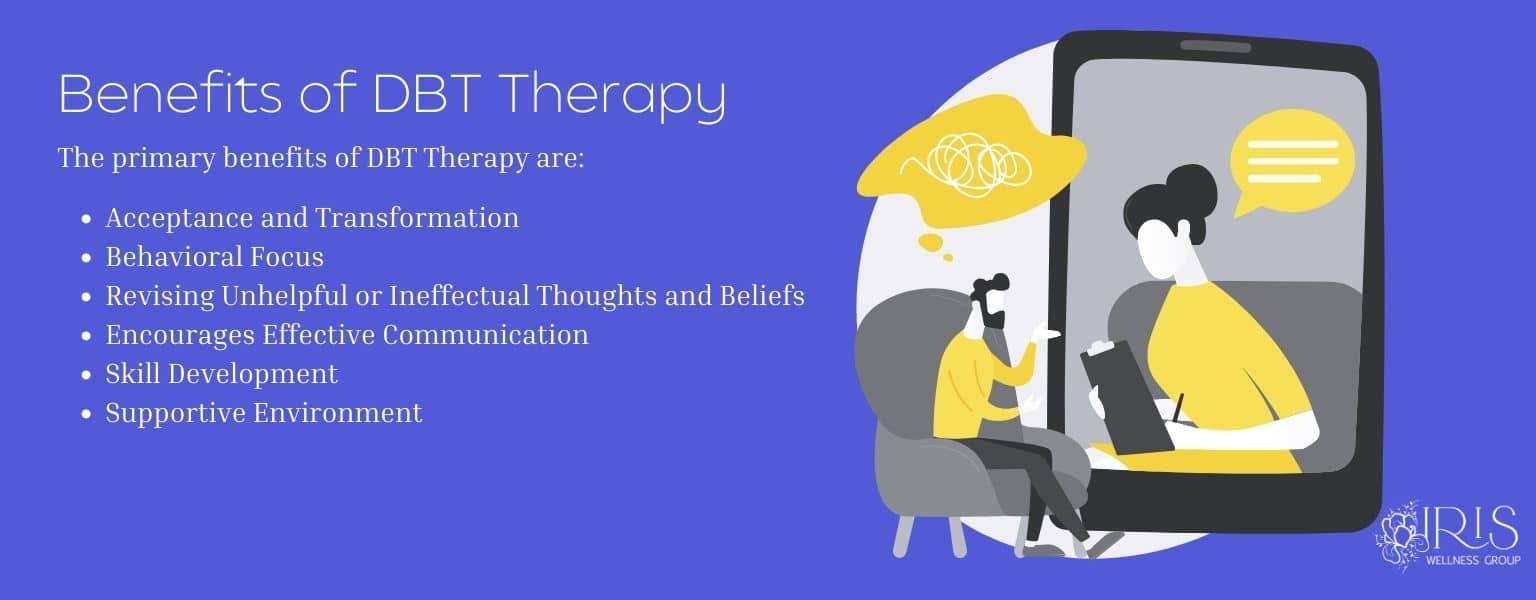Table of Contents
Dialectical Behavior Therapy (DBT) in Chattanooga, TN offered at Iris Wellness Group weaves together components of cognitive-behavioral therapy with mindfulness methodologies. Initially conceptualized to address borderline personality disorder, DBT Therapy is proven to be beneficial for various mental health challenges, such as depression, anxiety, and substance dependence.
What is Dialectical Behavior Therapy?
Debuting in the 1980s, DBT Therapy was primarily tailored to cater to individuals with borderline personality disorder. However, its utility has since been recognized for addressing other emotional disturbances, including depression. Stemming from the foundations of cognitive behavioral therapy (CBT), DBT places emphasis on structured dialogues steered by mental health experts. The essence of both CBT and DBT is to furnish individuals with the necessary arsenal to face emotional adversities, recalibrate behaviors, and hone adaptive coping skills.
DBT Therapy specifically zeroes in on heightening awareness about detrimental or skewed cognitive patterns. Amplifying this awareness equips individuals to tackle trying circumstances with fortified resilience, leading to a reduction in stress levels. A cornerstone of DBT is assisting individuals in embracing self-worth, even amidst the whirlwind of challenging emotions, fortifying their ability to surmount life’s complexities.
At the heart of both CBT and DBT lies the notion that reshaping our cognitive and behavioral patterns can pave the way for emotional relief. DBT distinctively underscores the vital, often overpowering emotions that are intertwined with numerous psychological conditions. It advocates for the identification and validation of these emotions as inherent fragments of our persona. Paradoxically, by recognizing our emotions, it doesn’t deter our pursuit of transformation. DBT posits that, while our emotional journeys are valid narratives, we concurrently possess the power to reshape our stories for a brighter, positive future.
What Is DBT Therapy Used For?
DBT Therapy in Chattanooga, TN is particularly advantageous for individuals grappling with emotional regulation. The therapeutic approach has proven its mettle in addressing a wide array of psychological concerns such as:
- Borderline personality disorder (BPD).
- Tendencies towards self-harm.
- Suicidal thoughts.
- Post-traumatic stress disorder (PTSD).
- Substance abuse.
- Eating challenges like bulimia and binge eating.
- Depression.
- Anxiety.
Central to this therapy is the recognition that many of these conditions arise from attempts to navigate intense negative emotions in counterproductive ways. Through DBT Therapy, individuals gain access to more constructive coping techniques.
How Does DBT Therapy Work?
DBT Therapy operates on four core principles, often delineated as the foundational skills or modules. These principles bridge the realms of acceptance and behavior modification:
- Mindfulness: Often the inaugural phase in DBT, mindfulness accentuates acceptance. It propels individuals to consciously perceive their emotions, thoughts, and actions without any biased judgments.
- Distress Tolerance: In the throes of a crisis, immediate behavior modification might seem elusive. That’s where distress tolerance comes into play. This aspect of DBT empowers individuals to navigate through emotional upheavals and demanding situations by embracing them as they unfold, rather than getting enmeshed in preconceived notions of how they ‘should’ be.
- Emotional Regulation: Central to this module is the art of balancing intense emotions. It commences with accurately pinpointing and naming emotions (distinguishing, for instance, between feelings of anger, sadness, or anxiousness). As the therapeutic process unfolds under the therapist’s aegis, individuals assimilate tactics to:
- Reduce susceptibility to intense emotional states,
- Cultivate more positive feelings,
- Steer clear of being swamped by overpowering emotions.
- Interpersonal Effectiveness: A salient component of DBT Therapy is to bolster interpersonal dynamics. Here, individuals learn the finesse of assertiveness, clarity in expressing their needs, and setting essential boundaries that pave the way for psychological well-being.
How Does DBT for Teens Work?
Dialectical Behavior Therapy (DBT) has been demonstrated through research to effectively address a range of issues in teenagers, such as substance use disorders, depression, PTSD, and eating disorders. Its core strength lies in aiding adolescents in managing and regulating their emotions.
DBT intersects with Cognitive Behavioral Therapy in many ways, aiming primarily to curtail harmful behaviors before addressing the underlying negative thought patterns that drive these behaviors. DBT for teenagers mission is to impart essential skills for overcoming and transforming detrimental behaviors into healthier ones.
The approach of DBT for adolescents encompasses both individual therapy sessions and group sessions designed specifically for them. In one-on-one therapy, the focus is on developing problem-solving strategies for immediate concerns and behaviors. These sessions also aim to mitigate the effects of past trauma, fostering an environment where teens can work through their traumatic experiences. Additionally, DBT seeks to bolster adolescents’ self-confidence and self-esteem, creating a more solid foundation for their overall mental well-being.
The Four Stages of DBT Therapy
DBT Therapy unfolds through a structured progression, divided into four distinct treatment phases:
- Stage 1: At the onset, the focus is on addressing and curbing the most severe and potentially harmful behaviors, such as tendencies towards self-harm or exhibiting suicidal inclinations.
- Stage 2: The therapeutic journey then shifts to tackling factors impacting one’s overall well-being. This phase hones in on enhancing interpersonal skills, mastering emotional regulation, and cultivating distress tolerance techniques.
- Stage 3: This stage pivots towards bolstering self-worth and refining the nuances of interpersonal interactions.
- Stage 4: Culminating the therapy, this phase is dedicated to amplifying life’s fulfillment. It’s about navigating ways to amplify joy, fortify relational bonds, and ardently chase life’s aspirations.

What are the Benefits of DBT Therapy in Chattanooga, TN?
DBT Therapy focuses on navigating the delicate balance between self-acceptance and the pursuit of change, aiming to evoke positive transformations in those undergoing therapy. A key component of this approach is validation, which when offered, tends to enhance an individual’s receptivity to change, reducing feelings of distress associated with the transition.
In essence, the therapist confirms that a person’s actions, though perhaps not the most beneficial, are understandable within the context of their unique experiences.
DBT’s framework is evident across different therapeutic modalities such as group skills training, individual counseling, and phone consultations. The primary pillars of DBT Therapy in Chattanooga, TN include:
- Acceptance and Transformation: The therapy equips individuals with tools to both embrace and endure life’s challenges and emotions. Simultaneously, it instills abilities that foster positive behavioral shifts and better interpersonal engagements.
- Behavioral Focus: DBT emphasizes analyzing and understanding detrimental behaviors, subsequently substituting them with healthier, more constructive alternatives.
- Cognitive Approach: Attention is directed towards revising unhelpful or ineffectual thoughts and beliefs.
- Collaborative Effort: DBT Therapy encourages effective communication, fostering a team spirit among the therapist, group facilitator, and psychiatrist.
- Skill Development: The therapy is structured to impart novel skills, enhancing an individual’s overall competence.
- Supportive Environment: A cornerstone of DBT Therapy is the emphasis on recognizing and leveraging one’s inherent strengths and positive attributes.
The Proven Effectiveness of DBT Therapy
DBT equips individuals with enriched coping mechanisms, allowing them to navigate and articulate their intense emotions with efficacy. Research affirms that the benefits of DBT cut across various demographic factors, including age, gender, gender identity, sexual orientation, and ethnicity.
For BPD: Studies underline the remarkable success of DBT Therapy in addressing borderline personality disorder (BPD), notably diminishing suicidal inclinations in BPD individuals. Remarkably, post a year of undergoing DBT, a staggering 75% of BPD individuals ceased to meet the diagnostic benchmarks for the disorder.
On suicidal thoughts: Data suggests that DBT Therapy interventions, especially those that pivot around skills training, manifest a heightened proficiency in mitigating suicidal ideation compared to DBT variants devoid of such training.
Broad-spectrum applications: While the majority of DBT Therapy research revolves around its influence on BPD individuals with a propensity for self-harm and suicidal behaviors, the therapy also demonstrates potential in managing other psychological challenges. Its proven impact spans disorders such as PTSD, depression, and anxiety.
DBT Therapy for Adolescents in Chattanooga, TN
Dialectical Behavior Therapy has become a beacon of hope for adolescents navigating the tumultuous waters of their formative years. Adolescence, marked by heightened emotional turbulence, identity quests, and peer pressures, often requires specialized therapeutic interventions. DBT, tailored for this age group, provides teens with the necessary tools to confront their unique challenges, from mood swings to academic pressures.
At the heart of this is the our Adolescent Intensive Outpatient Program (IOP) in Chattanooga, TN. The program adopts a comprehensive approach, blending traditional DBT Therapy principles with age-specific methodologies. It empowers adolescents to better manage their emotional responses, foster positive relationships, and build resilience against everyday stressors.
Through Teen IOP in Chattanooga, TN teens are not just recipients of therapy but active participants in charting their journey to well-being.
Start your DBT Therapy in Chattanooga, TN today
At Iris Wellness Group, our therapeutic approach seamlessly integrates evidence-based techniques across IOP (Intensive Outpatient Program), outpatient treatment, and PHP Program (Partial Hospitalization Program). We firmly believe that every individual deserves a life filled with wellness and balance. Through DBT Therapy, and our varied care levels, we provide tailored guidance for our clients as they embark on transformative paths to better mental health.
DBT Therapy emerges as a meticulous and practical approach tailored to address mental health dilemmas. Our adept team at Iris Wellness Group is adept at offering DBT Therapy in Chattanooga, TN, catering to a diverse demographic spanning different ages and backgrounds. Our hallmark is customizing treatments to align with the unique needs and goals of every client.
If you or a loved one is grappling with mental health challenges, contact to us today to begin your path to healing with our dedicated assistance.
Dialectical Behavior Therapy (DBT) Frequently Asked Questions
What Does DBT Therapy Do?
Dialectical Behavior Therapy (DBT) is designed to help people change patterns of behavior that are not helpful, such as self-harm, suicidal ideation, and substance abuse. It emphasizes balancing acceptance and change, helping individuals develop new skills to manage painful emotions and decrease conflict in relationships.
What's the Difference between DBT Therapy vs CBT
While DBT is derived from CBT, it differs by focusing more on emotional and social aspects, particularly around acceptance and mindfulness. DBT is often used for individuals with more severe emotional dysregulation, while CBT is generally applied to a broader range of mental health issues.
What Are the Six Main Points of Dialectical Behavior Therapy?
The six main points of Dialectical Behavior Therapy include mindfulness, distress tolerance, emotion regulation, interpersonal effectiveness, walking the middle path (balancing acceptance and change), and dialectics (integrating opposites).
Pros and Cons of DBT Therapy
Pros of DBT Therapy: DBT is effective for treating severe emotional disorders, improves interpersonal relationships, and teaches valuable coping skills.
Cons of DBT Therapy: It requires a significant time commitment and active participation, which might be challenging for some individuals.
Does Dialectical Behavior Therapy Work?
Yes, Dialectical Behavior Therapy has been proven effective, particularly for conditions like borderline personality disorder, depression, bipolar disorder, PTSD, and substance abuse. It helps reduce self-harm behaviors and improves emotional regulation.
How Does Dialectical Behavior Therapy Work?
Dialectical Behavior Therapy works by teaching patients skills in four key areas: mindfulness, distress tolerance, emotion regulation, and interpersonal effectiveness. It combines individual psychotherapy with group skills training to help individuals learn and apply these skills in their daily lives.
Dialectical Behavior Therapy Near Me and DBT Therapy Near Me
To find “Dialectical Behavior Therapy therapy near me” or “DBT Therapy near me”, search online for licensed therapists who specialize in DBT. You can also ask for referrals from mental health professionals or check with local mental health clinics.
Who is Chattanooga DBT Therapy Designed For?
Chattanooga DBT Therapy caters to individuals living in Chattanooga, Red Bank, Signal Mountain, Lookout Mountain, Southeastern Tennessee, Northern Georgia, or surrounding areas. These services are ideal for those who do not require medically supervised detoxification, have a stable and supportive home and work environment, and are self-motivated in their journey towards recovery.
What Conditions Does DBT Therapy Treat?
DBT Therapy is particularly effective for treating borderline personality disorder. It’s also used for treating eating disorders, substance abuse, depression, PTSD, and other mental health conditions where emotional regulation is a significant challenge.










